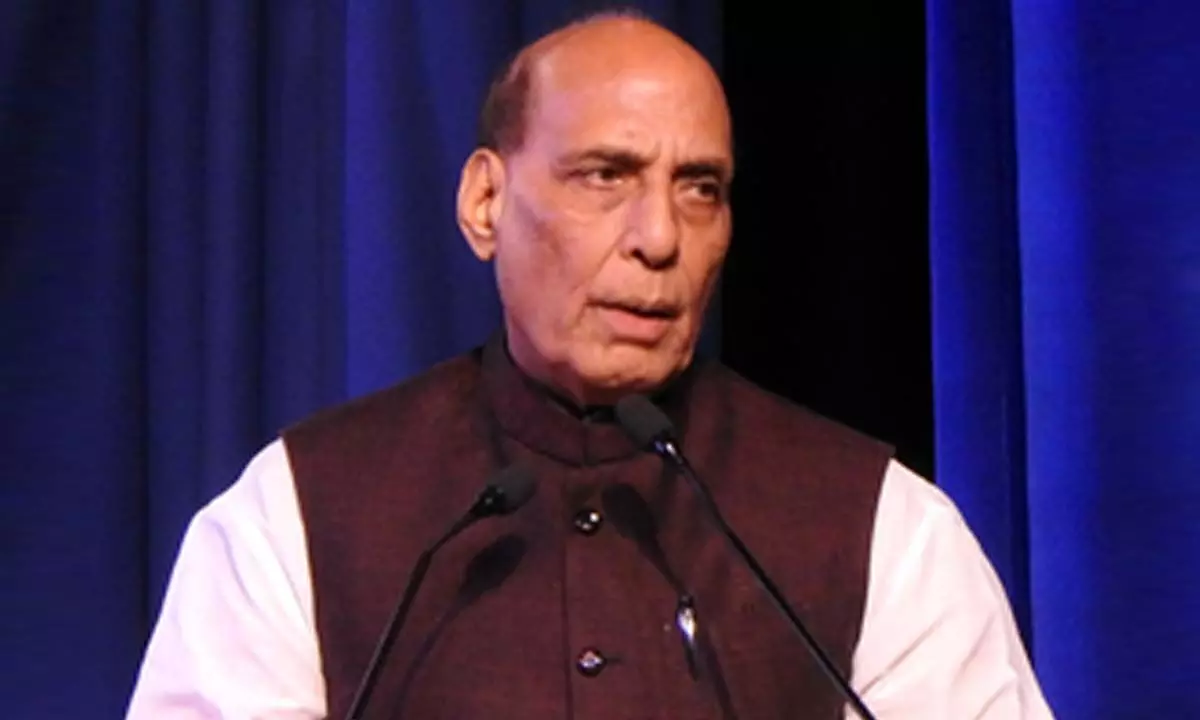Live
- Narsipatnam tank bund my dream project, says Speaker
- MLA Yashaswini slams Errabelli
- Sluggish pace persists at Stamps & Registration Office
- Kanguva’s Box Office Disaster: Is This the End of Suriya’s Mega Hit?
- Maoist killed, jawan injured in encounter
- Kerala Police Officer Brutally Murdered By Estranged Husband In Tragic Domestic Violence Case
- Pallishree Mela records good sales at Bali Jatra
- Kharif paddy purchase begins in Bargarh
- Faeces forced into tribal woman’s mouth
- Hyderabad's Air Quality Worsens as Winter Settles In | AQI Levels Reach Moderate Range
Just In
Adhere to int'l laws for free & rule-based maritime order: Rajnath

Defence Minister Rajnath Singh
Defence Minister Rajnath Singh on Monday said adhering to international laws for free and rule-based maritime order was essential, and called for establishing multinational collaborative mitigation frameworks in the Indian Ocean Region
New Delhi: Defence Minister Rajnath Singh on Monday said adhering to international laws for free and rule-based maritime order was essential, and called for establishing multinational collaborative mitigation frameworks in the Indian Ocean Region to effectively tackle common maritime challenges such as climate change, piracy, terrorism, drug-trafficking, over-fishing and freedom of commerce on high seas.
He was delivering the keynote address at the fourth edition of Goa Maritime Conclave (GMC).
The Defence Minister emphasised that common maritime priorities need to be addressed cooperatively by avoiding selfish interests that make the region less secure and less prosperous. He underlined the importance of respecting the international maritime laws, as enunciated in the United Nations Convention on the Law of the Sea (UNCLOS) 1982.
Rajnath Singh said, “A free, open and rule-based maritime order is a priority for all of us. ‘Might is right’ has no place in such a maritime order. Adherence to international laws and agreements must be our lodestar. Our narrow immediate interests may tempt us to flout or disregard the well-established international law, but doing so would lead to the breakdown of our civilised maritime relations.
"Our common security and prosperity cannot be preserved without all of us committing to cooperatively adhering to the legitimate maritime rules of engagement. Fair rules of engagement are crucial for fostering collaboration and ensuring that no single country dominates others in a hegemonic manner."
On climate change, he stated that the collaborative mitigation framework can involve the countries working together to reduce carbon emissions and transition to sustainable practices.
Singh also referred to Illegal, Unreported and Unregulated (IUU) fishing, a challenge which relates to resource over-exploitation. “IUU fishing endangers ocean ecosystems and sustainable fisheries. It also threatens our economic security and regional & global food security. A multinational collaborative effort for compilation and sharing of surveillance data is the need of the hour. It will help in identifying actors with irregular or threatening behaviour, which will have to be countered resolutely,” he added.
To put in place these mitigation frameworks, the Minister called for collaboration, and sharing of resources & expertise among nations.
He elaborated it further by explaining the difference between narrow national self-interest and mutual benefit based on enlightened self-interest of all nations.
“The optimal outcome often involves cooperation and building trust among nations, but the fear of being taken advantage of or acting alone in a hostile world can lead to suboptimal decisions. The challenge is to find solutions that promote cooperation, build trust and mitigate the risks. We build trust through dialogues such as GMC, joint exercises, industrial collaboration, sharing of resources, respecting international law, etc. Trust among cooperating countries would lead to optimal outcomes in respect of common maritime priorities,” he said.

© 2024 Hyderabad Media House Limited/The Hans India. All rights reserved. Powered by hocalwire.com






